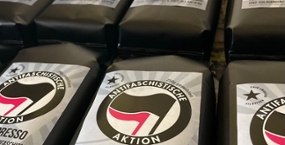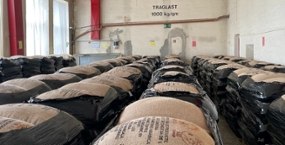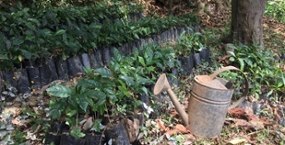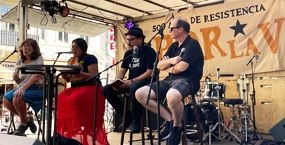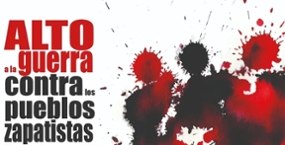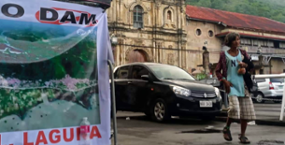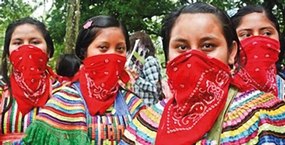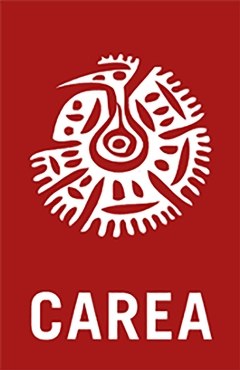Position paper of Café Libertad Kollektiv
Critical perspectives on European Deforestation Regulation (EUDR)
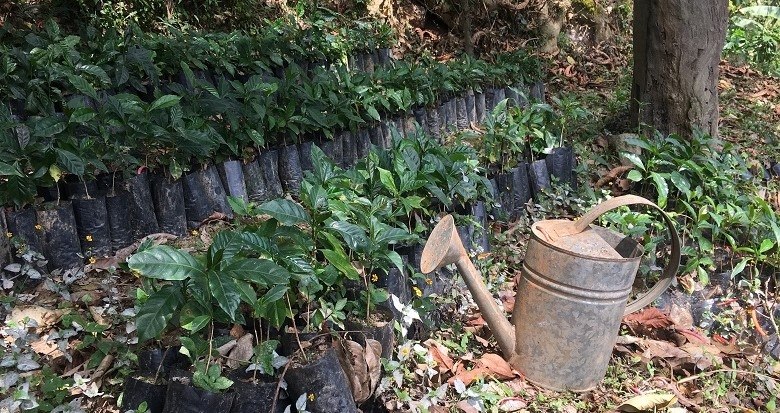
The regulation emphasises in its introduction the consideration of local and particularly indigenous communities as vulnerable groups needing special protection and to respect them accordingly. However, the actual implementation remains vague. The requirements instead give way to the apprehension of considerable hazards for small-scale producers of the goods concerned – including financial hardship due to increased cost and effort, the aggravation of existing land conflicts up to total prevention of exports, and consequently an erosion of empowerment and means of existence.
Café Libertad Kollektiv is a non-profit-oriented collective enterprise importing directly and distributing Europe-wide coffee of small-scale and mostly indigenous cooperatives from several Latin American countries, mainly Mexico/Chiapas but from Honduras, Costa Rica or Colombia as well. From this point of view, we are expressing our concerns and apprehensions. Social-ecological criteria are of great importance to our project. The establishment of relations of solidarity, the prospects and self-organisation of our cooperation partners, as well as Indigenous communities' experiences and their struggles for autonomy, are our crucial points of reference to counteract capitalist exploitation, the destruction of humanity and the environment, the continuation of traditional dependency relationships and the world market's asymmetries.
In our view, the EU directive misses indigenous producers' realities and jeopardises their existence, thereby undermining their self-organisation and resistance. An externally imposed administrative act, it reproduces and aggravates existing inequalities instead of questioning them. [1] We will develop this perspective including the following five points:
I. Requirements are ignoring the realities of Indigenous small-scale farmers
Additional cost and effort due to the obligation to produce supporting documents present a substantial burden for small-scale and Indigenous producers and can well exceed their resources. To support this evaluation, a look at the realities of bio-certification may be in order: Many (indigenous) coops do not just walk this path to realise better coffee prices on the world market but because ecologically sustainable production methods align with their identity. At the same time, acquiring a certificate is not always possible due to a lengthy and – from small-scale farmers' perspectives – rather an expensive process.
Specific batches of bio-certified coffee (or even the entire harvest) have repeatedly lost their bio-certification due to bureaucratic requirements because they couldn't provide the required chain of supporting documents for processing and distribution and meet deadlines needed due to faulty internet connection, weak administrative structures or irregularities due to volatile local conditions, particularly in conflict regions. Therefore, cases of actually bio-quality coffee only being able to be marketed and exported as non-bio are occurring more and more frequently, which in turn is exerting pressure on producers' prices despite already accrued additional costs. It is perfectly foreseeable that the EU regulation's obligation regarding the geo-localisation of cultivated areas will generate similar problems.
II. Limitation of sustainable marketing opportunities is threatening livelihoods
In cases of non-successful bio-certification, there is at least the option to sell raw coffee as non-bio worldwide. Alas, this option is void regarding the documentation of non-deforestation supply chains. If producers are (even only once) unable to meet the requirements, marketing channels to Europe will disintegrate entirely. Established trade relations ensuring better-than-world-market prices – as usual in the context of fair and solidary trade – can not be continued.
Producers would be compelled to market their produce under the free market's competitive conditions, exposing themselves to competition, the market power of giant corporations, and volatile price fluctuations. This would considerably jeopardise the situation of (indigenous) coops and small-scale farmers and endanger their subsistence and self-organisation.
III. Benefits to private property, drawbacks to collective usage
The obligation to produce supporting documents fundamentally threatens the existence of collective or contested property relations. Generally, big landowners have property titles of the cultivation areas they had incorporated violently into their estate. These property titles ensure entitlement to these territories, and they will not have any problems producing supporting documents. This, on the other hand, cannot be taken for granted concerning indigenous producers. On the contrary, they frequently live and produce in traditional communal structures that are not entirely embedded into statehood and private property relations and are, therefore, not subject to a comprehensive registration of cultivation areas.
Moreover, there are many cases of property appropriation by indigenous producers due to poverty migration or historic colonialism-based land conflicts without ever acquiring (or even being able to acquire) any official property status. Zapatista self-organisation, conflicts in the border region between Honduras and El Salvador, and the landless movement in Brazil may serve as examples. Establishing the obligation to produce supporting documents excludes and stigmatises collective approaches of self-organisation and self-empowerment struggles against poverty, capitalist land grab and the persistence of colonial heritage for the benefit of thoroughly regulated conditions and private property.
IV. Aggravating land grab and repression
Furthermore, the Mexican example illustrates profound scepticism towards the EU regulation's alleged cooperation with producer countries' governments is justified. The Mexican government's reforestation and social program "Sembrando Vida" (sowing life) is particularly interesting in this context. Additional forest areas have frequently been cleared to benefit from reforestation subsidies and social benefits. However, newly planted forests cannot supplant the original forests. On the other hand, property titles are essential for participation in the program. Indigenous activists are reporting cases of recently occurring desire to designate land as private property, which is, in turn, aggravating land conflicts. EU regulation's intended geo-localisation will probably cause similar problems. Additionally, the state's access to this mapping is an additional instrument for monitoring resistant communities that are already subject to fierce repression.
In Mexican Chiapas, for instance, there has been a surge in militarisation of this region, a steep increase in organised crime and a literal explosion of paramilitary violence against indigenous communities and their cultivation areas. This is taking place with the Mexican government's tacit approval or even subliminal support as it is a part of the state's riot control strategy. Regional and local governments are frequently involved in these occurrences and are thus further fuelling the escalation. According to local observers, Chiapas is pushed to the brink of a civil war. [2] Protection of indigenous producers by the Mexican government is, therefore, not to be expected. Quite to the contrary, the state's policy is a substantial part of the problem and has to be pushed back to enhance local communities' self-organisation and autonomy.
V. Momentous reproduction of colonial perspectives
The EU regulation regards indigenes as objects rather than social agents. They are allegedly protected; otherwise, they are rarely mentioned. Contrary to the potential influence of prominent economic and political lobby organisations, indigenes have never been heard, let alone allowed to participate in the legislation process. Consequently, they are also not considered as producers of the export and import goods in question. As mentioned above, their situation is becoming a blind spot and more aggravating. Moreover, the envisaged "risk assessment" and "benchmarking" evaluating the probability of compliance with the regulation tend to be the opposite of protection. E.g. one criteria of "risk assessment" required for imports into the EU Economic area reads as follows:
- "the existence of duly reasoned claims by indigenous peoples based on objective and verifiable information regarding the use or ownership of the area used to produce the relevant commodity" (Article 10, Paragraph 2e).
This paragraph and its intentions remain somewhat vague. However, "duly reasoned claims" are precisely a part of the problem: Either they can be positioned against "Indigenous people", or they are just what they cannot provide. There is no further elaboration on this issue. And if producers originate from an estimated high-risk country regarding regulation violations – as is probably the case with Mexico – an even more detailed review of local conditions is required. While the real causes of climate change lie elsewhere, Indigenous producers are subject to general suspicion and, if deemed necessary, increased monitoring.
Indigenous producers' knowledge and expertise regarding social-ecological cultivation methods are not considered, despite small-scale farmers' production processes frequently practising sustainability "from below" free of profit orientation, e.g. cultivating coffee in a fragmented and diversified way below shadow trees in the secondary rain forest. On a more general level, an uncanny pattern is occurring: Indigenous communities are the first to fight for rainforest protection and against the destruction of the environment - and are left alone and even antagonised as "insurrectionists".
An appalling example of the devastating destruction of ecosystems in favour of economic interests is the Tren Maya mega project on the Yucatan peninsula, which was realised against massive protests with the military's participation. During the regulation's design, have European institutions considered corporations' (like Deutsche Bahn) share of responsibility in this destruction and deforestation, and how should they be sanctioned?
Supporting indigenous producers' self-organisation!
To sum up, the EU regulation's development has completely missed the point of indigenous populations' realities. They have not participated at any moment. Instead, they are subject to additional obligations and requirements. Their social-ecological production methods and struggles for a self-determined life are subject to increased pressure. It is essential to exempt them from the obligation to produce supporting documents to avoid aggravating the challenging conditions of rural self-organisation, e.g. in landless movements or cooperatives.
We don't have answers to all the questions. Still, we are sure of this: Instead of regulation "from above" enmeshed in really existing capitalism's relationships, structures characterised by and constantly reproducing violence, inequality, and exploitation have to be pushed back. This, in turn, is only possible with indigenous agents' participation and supporting them as non-patronising as possible. We at Café Libertad will continue to create personal, solidary, and trusting relations and rely on direct cooperation with indigenous communities and their member-based cooperatives of small-scale farmers.
Café Libertad Kollektiv, May 2024
[1] Scientists have expressed similar apprehensions based on an analysis of empirical data in the Forest Policy and Economics magazine. This article is behind a paywall; you can access an abstract at https://www.sciencedirect.com/science/article/abs/pii/S1389934122001307?via%3Dihub
[2] You can find a recent report and Indigenous activists' assessments of the situation in Chiapas and Mexico here: Rebellious Europe trip: Report of Indigenous activists (cafe-libertad.de). A detailed analysis of the catastrophic development in Chiapas and the interaction of violence escalation and the state's complicity has been published recently by the human rights centre FrayBa: Frayba Report: Chiapas a disaster | CDH Fray Bartolomé de Las Casas
